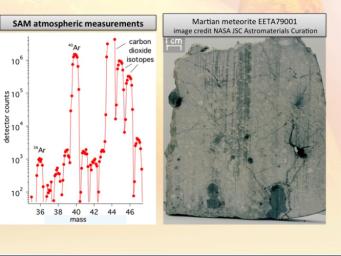
|
Weighing Molecules on Mars
- Click the image above for a larger view
- Full-Res JPEG (720 x 540) (58.8 kB)
- Full-Res TIFF (720 x 540) (1.2 MB)
Caption:
The plot on the left shows new results from the Sample Analysis at Mars, or SAM, instrument on NASA's Curiosity rover. The instrument measured levels of different gas isotopes in the atmosphere. Isotopes are variations of atoms weighing different amounts. As seen on the plot, SAM detected about 2,000 times as much argon-40 as argon-36, which weighs less. This result is the most precise measurement yet of argon isotope ratios on Mars, and confirms the connection between Mars and Martian meteorites found on Earth, an example of which is shown at the right. The dark blobs in the meteorite are areas where atmospheric gases were trapped when the meteorite was ejected from Mars, and they include argon with the same ratio of argon-40 to argon-36 as SAM has measured in Gale Crater.
The data at left also show peaks for carbon dioxide containing different isotopes of carbon and oxygen. The carbon dioxide at mass 44 contains the most abundant isotopes of both carbon and oxygen, so it has the largest signal, with its peak being higher than the top of the chart shown here.
Background Info:
Researchers are using Curiosity's 10 instruments to investigate whether areas in Gale Crater ever offered environmental conditions favorable for microbial life. JPL, a division of the California Institute of Technology in Pasadena, manages the project for NASA's Science Mission Directorate, Washington, and built Curiosity. The SAM instrument was developed at Goddard with instrument contributions from Goddard, JPL and the University of Paris in France.
For more information about Curiosity and its mission, visit: http://www.nasa.gov/msl and http://mars.jpl.nasa.gov/msl .
Cataloging Keywords:
| Name | Value | Additional Values |
|---|---|---|
| Target | Mars | |
| System | ||
| Target Type | Planet | |
| Mission | Mars Science Laboratory (MSL) | |
| Instrument Host | Curiosity Rover | |
| Host Type | Rover | |
| Instrument | Sample Analysis at Mars (SAM) | |
| Detector | ||
| Extra Keywords | Atmosphere, Color, Crater | |
| Acquisition Date | ||
| Release Date | 2012-11-02 | |
| Date in Caption | ||
| Image Credit | NASA/JPL-Caltech/JSC | |
| Source | photojournal.jpl.nasa.gov/catalog/PIA16462 | |
| Identifier | PIA16462 | |
